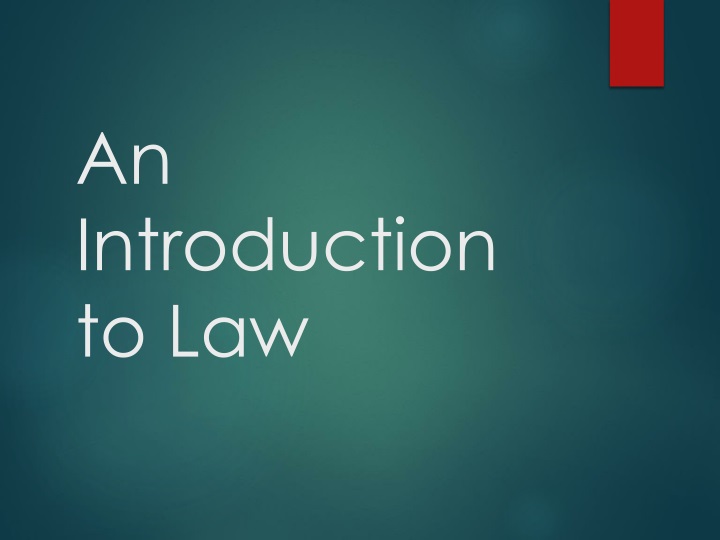Law is Man made. It changes over time to accommodate the society's need. Law is not easy to define. Law consists of enforceable rule governing relationships among
individuals and between individuals and their society. The
term “Law’ denotes different kinds of rules and Principles. Law is an instrument
which regulates human conduct/behaviour. Law means Justice, Morality, Reason,
Order, and Righteous from the view point of the society. Law means Statutes,
Acts, Rules, Regulations, Orders, and Ordinances from point of view of
legislature. Law means Rules of court, Decrees, Judgment, Orders of courts, and
Injunctions from the point of view of Judges.
It is very difficult to state a single and accurate
definition of the term "law" as it is a general term and has
different connotations for different people. On the one hand a common man may
think of law as a set of rules he has to obey on the other hand for a judge, it
is nothing but a set of guiding principles to be applied in deciding the cases.
Law is everywhere, if you examine the human being life, there is "Law of
nature".
According to Thomas Jefferson: "The study of the law qualifies a man to be
useful to himself, to his neighbours, and to the public."
The law is a set of general ideas. When these general ideas are
applied, a judge cannot fit a case to suit a rule; he must fit (or find) a rule
to suit the unique case at hand. And finally the judge must also supply
legitimate reasons for his decisions.
When we look at the development of law, there are several things they
have had a major influence. Some of the more important elements are customs,
history, and logic.
The term law denotes different kinds of rules and principles. It is used in various senses. When we speak of the Law of a State, it is used to special and strict sense. Law is an instrument, which regulates the Human Conduct or behavior. The State with the help of law maintains law and order and ensures peace and social security. In simple words, law is a rule of human conduct imposed and enforced by the State. Thus the object or main purpose of law is to secure to all, justice and equality.
Law changes from region to region, religion to religion and from time to time as per the needs of the society.
The law is subject to change with the change in
society and also change in the Government / legislative through the
amendments/Acts.
Generally the term law is used to mean three
things:
First it is used to mean “legal order”. It
represents the regime of adjusting relations, and ordering conduct by the
systematic application of the force of organized political society.
Secondly, law means the whole body of legal
Percepts which exists in a politically organized society.
Thirdly, law is used to mean all official control
in a politically organized society. This lead to actual administration of
Justice as contrasted with the authoritative material for the Guidance of
Judicial action. Law in its narrowest or strict sense is the civil law or the
law of the land.
Definition of Law:
Here are some definitions of Law stated by scholars.
1) Thomas Jefferson: "The study of the law qualifies a man to be useful to himself, to his neighbours, and to the public."
2) Austin: Law is command of sovereign.
John Austin (1790-1859) An English Jurists
expounded the concept of analytical positivism, making law as a command of
sovereign backed by sanction. He developed logically, a structure of legal
system in which he gave no Place to values, morality, idealism and Justice.
According to Austin, a law, in the strict sense is
a general command of the sovereign individual or the sovereign body. Issued to
those in subjectivity and enforced by the physical power of the state.
According to Austin “law is aggregate of rules set by men politically superior
or sovereign to men as politically subject.”
Austin says, “A law is command which obliges a
person or persons to a course of conduct.
Austin’s definition of law is subjected to
criticism on the ground that it ignores completely the moral and ethical
aspects of law and unduly Emphasized the imperative character of law.
3) Salmond: Law is the body of principles recognised and applied by the State in the administration of justice.
Salmond
did not define the expression Justice. Keeton says what has been considered to
be just at one time has frequently not been so considered at another. Dean Roscoe Pound has criticized the definition of
Salmond as reducing law to a mass of isolated decisions and the law in that
sense to be an organic whole. Further, it is criticized on the ground that
Salmond’s definition applies only to lax law not to Statute. Despite criticism, Salmond’s definition is
considered as the workable definition.
4) Blackstone: Law in its general and comprehensive sense, signifies a rule of action and is applied indiscriminately to all kinds of actions, whether animate or inanimate, rational or irrational.
5) Savigny: Law is not the product of direct legislation but is due to the silent growth of custom or the outcome of unformulated public or professional opinion. Also Law is not as body of rules set by a determinate authority but as rules consist partly of social habit and partly of experience.
6) Pound: Law is the body of principles recognised or enforced by public and regular tribunals in the administration of justice. Pound defines law as a social institution to
satisfy social wants. He says law is a social engineering, which means that law
is a instrument to balance between the competing or conflicting interests.
7) John Chipman Gray: the Law of the State or of any
organized body of men is composed of the rules which the courts, that is the
judicial organ of the body lays down for the determination of legal rights and
duties.
Gray’s definition is criticized on the Ground that
he is not concerned with the nature of law rather than its Purposes and Ends.
Further it does not take into account the statute law.
8) Thomas Erskine Holland: Law is a General rule of
external human action enforced by a political sovereign. Holland also measures
or defines law with preference to sovereign devoid of moral, ethical or ideal
elements which are foreign to law and Jurisprudence.
9) John Erskine: Law is the command of a
sovereign, containing a common rule of life for his subjects and obliging them
to obedience.
10) Hans Kelsan: According to Kelsan legal order
is the hierarchy of the norms, every norm derives its validity from the
superior norm and finally there is highest norm known as grundnorm.
11) H. L. A. Hart: Law is the combination of primary
rules of obligations and secondary rules of recognition.
12) Ihering: law is the form of Guarantee of the
conditions of life of society, assured by state’s power of constrain. He says
law is a means to an end and end of the law is to serve its purpose which is
social not individual.
13) Dias: Law consists largely of “ought”
(normative) Propositions prescribing how people ought to behave the “ought” of
laws are variously dictated by social, moral, economic, political and other
purposes.
Origin of Law:
Thanks for reading till the end. Please follow and share this blog for more law notes.






